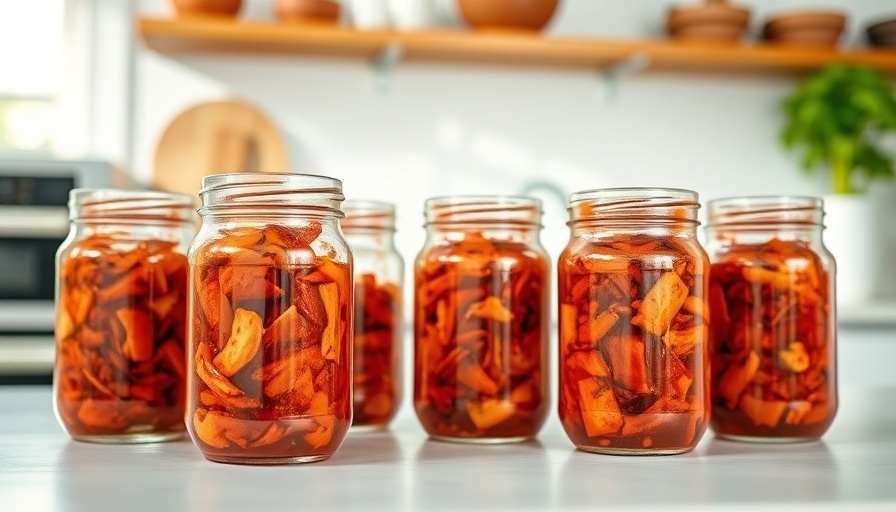
Understanding Stomach Cancer: An Overview
Japan is known for its astounding life expectancy, yet it faces a troubling paradox: one of the highest rates of stomach cancer in the world. The enigma arises from the interplay of factors, primarily the notorious bacterium H. pylori, which has been linked to chronic inflammation and, subsequently, cancer formation. Yet, despite its severe implications, not all individuals infected with H. pylori develop stomach cancer. The statistical anomaly of lower stomach cancer rates in regions like Nigeria and India, which have higher H. pylori prevalence, indicates a deeper narrative, potentially tied to dietary habits that modulate the risks.
In 'Friday Favorites: Kimchi, H. Pylori, Stomach Cancer & How to Treat H. Pylori Naturally with Diet,' we delve into the critical connections between diet and stomach cancer, spurring a deeper analysis of effective dietary interventions.
Dietary Influences and Cancer Rates
Emerging from recent studies, preserved and salted foods have been identified as potential culprits in stomach cancer prevalence. Countries like Korea and Japan, where these practices are common, exhibit higher stomach cancer rates compared to their global counterparts. On the flip side, fresh fruits and vegetables have been shown to significantly lower the odds of developing stomach cancer. Specific vegetables, particularly cruciferous ones like broccoli and garlic, not only contribute to overall health but may play an instrumental role in fighting against H. pylori and related carcinogenic processes.
Cruciferous Vegetables: Nature’s Powerhouses
Cruciferous vegetables, including broccoli sprouts, are gaining attention for their potential to eradicate H. pylori and prevent cancer. Research suggests that these vegetables contain sulforaphane, a compound known for its antimicrobial properties. In studies, patients consuming broccoli sprouts saw significant reductions in H. pylori levels after just a week. Though drug therapies present higher efficacy, the natural approach through diet offers a promising pathway, particularly for those hesitant about antibiotic treatments.
The Garlic Connection: Shining Light on Cancer Prevention
Garlic, a staple in many cuisines, has also been linked to lower stomach cancer rates. Multiple studies indicate that allium vegetables, particularly garlic, possess protective qualities against cancer. These benefits are substantiated by research exploring garlic's effectiveness against H. pylori. Though initial results regarding its cancer-prevention effect were inconclusive, long-term studies showed a marked reduction in the risk of cancer death for those who integrated garlic into their diets.
Navigating the H. Pylori Treatment Landscape
Typically, H. pylori infections are treated using antibiotics; however, natural approaches are becoming increasingly popular. In addition to broccoli sprouts and garlic, a diet rich in fibrous fruits and vegetables could yield health dividends. For those struggling with the side effects of medications or seeking alternatives, a focus on holistic nutrition may not only alleviate symptoms but could also enhance overall wellbeing.
The Role of Processed Foods and Salt
It’s vital to consider how dietary components like salt and processed meats influence cancer risk. These not only seem to promote H. pylori's harmful effects but also independently contribute to cancer risk. Understanding how these factors interplay reveals crucial insights into dietary modifications that could lower stomach cancer rates, particularly in regions prone to high incidences.
Call to Action: Embrace Healthy Eating for Longevity
As we discuss the intricate relationship between diet, H. pylori infection, and stomach cancer, it’s clear that adopting healthier eating habits can have profound implications for longevity and overall health. By incorporating more whole foods, like cruciferous vegetables and garlic, into your diet, you’re not just promoting a healthier lifestyle but also taking proactive steps in the prevention of serious health issues.
Your nutrition choices could be the key to unlocking a healthier, longer life. Let's take a moment to evaluate our eating habits and see how we can make healthier choices together, benefiting both our bodies and minds.
 Add Element
Add Element  Add Row
Add Row 



Write A Comment